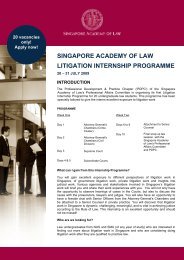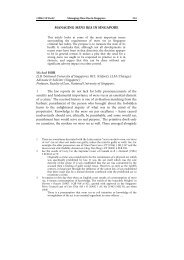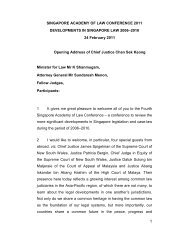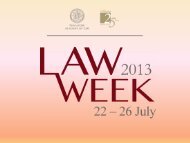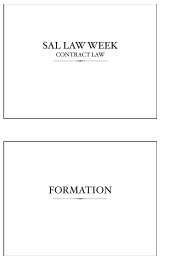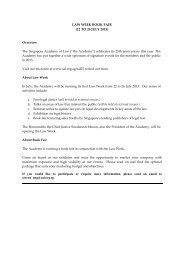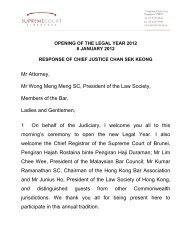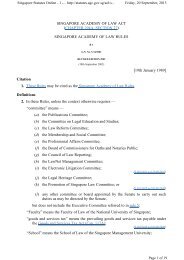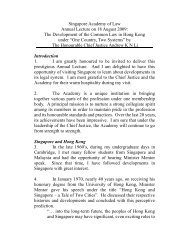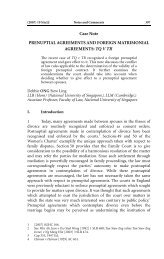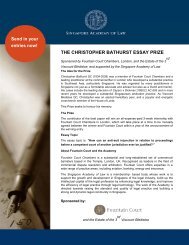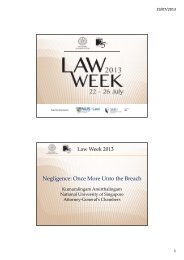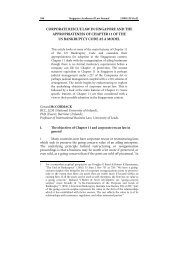View Article - Singapore Academy of Law
View Article - Singapore Academy of Law
View Article - Singapore Academy of Law
You also want an ePaper? Increase the reach of your titles
YUMPU automatically turns print PDFs into web optimized ePapers that Google loves.
15 SAcLJ Matrimonial Assets and the 3 rd Party 291<br />
case. After that decision is made, the court will proceed to hear the other<br />
matter immediately thereafter. The witnesses called and the affidavits <strong>of</strong><br />
evidence in chief filed will only address those issues in respect <strong>of</strong> that<br />
second matter. Pinsler has observed that the process <strong>of</strong> successive<br />
hearings is administratively convenient and saves the witnesses, who are<br />
involved in two or more actions, the expense <strong>of</strong> having to attend court on<br />
two or more separate occasions 120 .<br />
6.4.1.3 Order for Stay<br />
197 However, as stated earlier, the court may also order one <strong>of</strong> the<br />
matters (usually the ancillary matters) to be stayed until the other is<br />
determined 121 (“order for stay”). In the order for stay situation:<br />
(a) Hearing dates for the first matter would be fixed first. Only after<br />
the first matter is disposed <strong>of</strong> would parties then apply for a second<br />
set <strong>of</strong> hearing dates for the second matter.<br />
(b) The affidavits to be filed in respect <strong>of</strong> the second matter would<br />
usually be held back, pending the outcome <strong>of</strong> the first matter. All<br />
other steps to be taken to prepare for the hearing <strong>of</strong> the second matter<br />
(interlocutory applications, for example) would also be stayed until<br />
the first matter is disposed <strong>of</strong>.<br />
198 If the matters are ordered to be tried in immediate succession,<br />
however, preparations for the hearing <strong>of</strong> both matters would proceed<br />
concurrently. The same set <strong>of</strong> hearing dates will be given for both<br />
matters.<br />
199 This means that in order for stay situations, witnesses and parties<br />
would have to attend court on at least two separate occasions, and the<br />
time taken for all matters to be finally disposed <strong>of</strong> would be longer than<br />
if the matters were ordered to be tried in immediate succession.<br />
200 It is submitted that an order for stay would be more appropriate<br />
than an order that the matters be tried in immediate succession if the<br />
factors in Section 6.1 (a)-(d) were not present, and (i) the preparation (in<br />
120 See <strong>Singapore</strong> Court Practice 2003, Jeffrey Pinsler at p 74.<br />
121 For an example <strong>of</strong> where this was done, see the case <strong>of</strong> Leong Choon Kum (m.w.) v<br />
Chia Kin Tuck, supra, where the Family Court ordered the ancillary matters<br />
proceedings stayed until a certain date, when a High Court suit involving the husband<br />
and wife would have been disposed <strong>of</strong>. (Family Court judgment dated 22 August<br />
2000) On appeal, however, the High Court ordered that the High Court suit be<br />
transferred down to the Family Court. (See Section 6.4.2.2).



